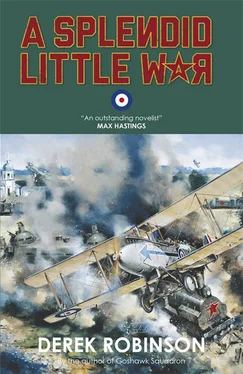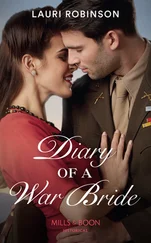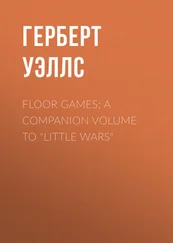“It’s horrible. But this is the Donbas, the richest part of all Russia. Almost all our coal comes from here. Masses of steel. If it weren’t for the Donbas, there would be no railway lines.”
“Admirable. I hope their chronic lung disease allows them to raise a feeble cheer. Can we go home now?”
“I just want to show you the town. It’s not far.”
Makeyevka turned out to be modern and sensibly planned, with wide avenues. There were the usual onion domes, blackened by years of pollution. Everything was smoke-stained: the houses, the trees, the river, the clothes, the people. Borodin pointed to the balcony of a hotel. “Last year Nestor Makhno made a tremendous speech from there, all about anarchy and what a fine thing it is, and to prove it his army would fight everyone in the name of a free and independent Ukraine. He was very popular. Still is.”
“Are we in the Ukraine?”
“Yes.”
“And do they support General Denikin?”
“Probably not. I expect he’ll capture some of it. Everyone does. Then they lose it. Fighting in the Ukraine is like filling a wheelbarrow with frogs. Anyone can do it but nobody can keep the frogs in the wheelbarrow.”
“I need a drink. Let’s go home. Top speed.”
They drove back to the squadron trains. He paid off the droshky and they walked to The Dregs. “I’m glad you stayed with us,” he said. “I feared you might want to escape the sad memories.”
“I reported to Mission H.Q.,” she said, “and ten minutes of whisky breath and pipe smoke was more than enough, so I scuttled back here, where there’s a job for me.”
A flight-sergeant was waiting, and he saluted. “Beg pardon, ma’m. Aircraftman Simms reported sick. Unfit for duty. Boil on his backside, ma’m.”
She looked at Borodin. “When all else fails, there are always boils on backsides. Lead on, flight sergeant, before it explodes and kills the onlookers.”
4
At first light next morning, the C.O. met the adjutant and the count on the platform. “What news?” he asked.
“I set an armed guard, in case his friends came to save him,” the adjutant said. “If he has friends. A poor specimen. Whimpers a lot. It got very cold.”
“He’ll survive. He’s fat,” Borodin said. “Most stationmasters are. Bribes, bribes. I saw him after supper and he told me we could have the correct identification plates for a hundred roubles.”
“Cheeky devil.”
“He was lying. I could tell. His kind always lies.”
“We’ll go and see him,” Wragge said.
All the strength had drained from the stationmaster’s limbs. He hung from his ropes like an out-of-work puppet. The colour had gone from his face. His belly slumped: a sack of waste. His eyes were half-shut as he watched them approach.
“Tell him we’re leaving in an hour,” Wragge said. “Tell him we want genuine plates or we’ll have a head-on collision and he’ll be meat in the sandwich.”
Borodin told him, and the stationmaster began to sob. He croaked his answer.
“He swears on the soul of his dead mother and various Christian saints,” Borodin said. “But he’s still lying.”
“Breakfast,” Wragge said.
The Dregs was a subdued place. Camel pilots drifted in, sensed the atmosphere, got on with their eggs and bacon.
“We’ll have one more crack at him,” Wragge said. “Try and terrify the truth out of him.”
“If it doesn’t?” the adjutant said.
Wragge sipped his coffee and failed to find an answer. “We’ll never catch Denikin if we keep limping along,” he said. “He’s probably advancing faster than we are.”
The squadron doctor came in, carrying a small box that was heavily sealed and decorated with a large red cross. “I’m acting on orders from Mission H.Q.,” she said. “This won’t take long.”
Wragge waved a hand.
She cut the seals and opened the box and took out a couple of small glass tubes, closed with corks. “Morphine. Wonderful painkiller. A few grains of morphine are a godsend when you have typhus. Tif , the Russians call it. Also dysentery, which gives you terrible griping pains in the gut. And cholera. Morphine won’t save you but you suffer less. Ditto malaria. H.Q. wants every man to have a phial of morphine.” She handed them out.
“Thank you, flight lieutenant,” Wragge said.
“There’s more. If you swallow the entire contents of a phial, you will die quickly. You may feel this is preferable to being captured by the enemy. It’s the real reason why H.Q. wants everyone to have a phial.”
“Crikey,” Jessop said. “Crikey Moses.”
“Suicide,” Maynard said. “That’s a bit steep, isn’t it? I mean to say, it’s asking an awful lot of a chap.”
“It’s not compulsory, Daddy,” Wragge said.
Borodin cleared his throat. “I don’t think you can expect to receive prisoner-of-war status. The Bolsheviks kill all captured officers and they are especially hard on foreigners. Invaders, in their view. Torture is normal.”
“They nearly cut off Gerry Pedlow’s goolies,” Jessop said.
“That was for religion,” Dextry pointed out.
“Even worse. If the Russian Christians cut off your goolies, what will the Bolos be like?”
“Are you sure H.Q. authorized this?” Maynard asked the doctor. “I mean, suicide’s illegal. Isn’t it?”
Wragge signalled Brazier and Borodin. They left, and walked to the locomotive. “Tell the driver to make a lot of noise,” Wragge said. “Blow off steam, sound his whistle, ring his bell. Then go fifty yards and stop and come back here.”
The racket was impressive. The bell was above the stationmaster’s head and he was in pain every time it clanged. A small crowd of railway workers watched from a distance. They made no move to interfere. “He has probably been stealing part of their wages,” Borodin said. “Most stationmasters do.”
The locomotive spun its wheels, shot out sparks, made a scream of steel on steel, and pulled away, clanging non-stop. The stationmaster shouted but his voice was lost. Some of the pilots looked out from The Dregs and waved goodbye to the C.O. A minute later the train reversed and they waved hello.
Borodin asked the stationmaster a question and got a stammering answer.
“The correct identification plates are in his office,” Borodin said.
“Can you be sure?” Brazier asked.
“He has fouled his breeches,” Borodin said. “An infallible declaration of honesty.”
A couple of plennys cut the man free. He fell on the tracks. They picked him up and carried him, the officers following. He found the identification plates. He had recovered some strength, and he took the plates to the trains and attached them to the locomotives. The plennys marched him outside the station and dumped him in a horse trough. “It’s the least we can do for him,” Brazier said. “Some would say, the least is too much.”
They went backs to the trains. The squadron doctor was waiting. “Your chaps spent all their pay in Taganrog,” she said. “Now they’re playing poker, and they’re using the morphine phials as betting chips.”
They laughed. After the saga of the stinking stationmaster, almost anything was funny. Brazier’s chuckle was brief. Gambling with property belonging to Mission H.Q. was certainly an offence. But, as Maynard had said, suicide was a crime too. Did two wrongs make a right? He gave up.
They boarded the train, Wragge gallantly allowing Susan Perry to go first. “I don’t think I told you,” he said. “We’re all pleased that you decided to continue as squadron doctor.”
“I had to leave Taganrog,” she said. “A brigadier was besotted with me.”
“So is half the squadron.”
Читать дальше











